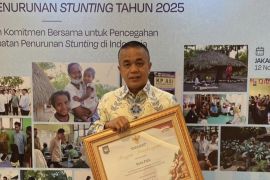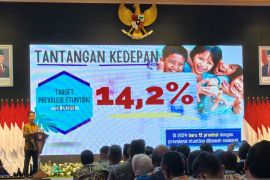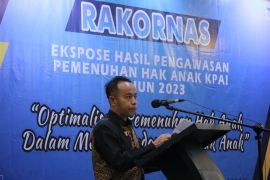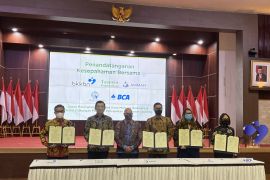The ministry's deputy for Coordination of Health Quality Improvement and Population Development Y. B. Satya Sananugraha stated that access to safe sanitation is a national priority and is closely related to development.
"We also know that 73 percent of (cases of) diarrhea are caused by the (intake of) low quality of drinking water and (lack of proper) sanitation and hygiene facilities," he stated at the City Sanitation Summit XXI 2023 here Thursday.
"It is also conveyed that 15 percent of the stunting cases are caused by diarrhea in children, low quality of drinking water, and (lack of) safe sanitation," he remarked.
Sananugraha explained that based on a study conducted on a population, 21.58 percent of cases of stunting in toddlers in rural areas can be prevented by the provision of better access to drinking water and sanitation facilities to prevent repeated infections.
However, he noted that Indonesia is currently confronted by several challenges in the provision of drinking water and sanitation facilities, such as the large size of slum areas, the need for strong commitment among regional governments, and limited access to funding.
Based on data in 2022, the rates of adequate sanitation and safe sanitation have only reached 80.9 percent and 10.16 percent respectively.
Meanwhile, in the National Medium-Term Development Plan (RPJMN), adequate sanitation and safe sanitation are respectively targeted to reach 90 percent and 15 percent by 2030.
To this end, he sought strong commitment from all parties and stakeholders to encourage a shift in people's behaviors to create access to adequate drinking water and sanitation facilities.
At Thursday's event, he lauded several provinces, such as Riau Islands, Banten, Bali, Yogyakarta, Aceh, and Jakarta, that have reached the safe sanitation target of 15 percent.
Meanwhile, Head of the Association of Districts and Cities Concerned about Sanitation (Akkopsi) Ahmed Zaki Iskandar stated that people's quality of life is determined by the pre-pregnancy period, gestational phase, and up to the first one thousand days of life, among other factors.
Iskandar emphasized that the quality should be supported by safe sanitation to prevent various diseases in children.
He also noted that the prevalence of stunting in Indonesia is still at 22.6 percent, while President Joko Widodo is targeting to reduce it to 14 percent by 2024.
Related news: BP3OKP asks UNICEF to help Papuan regions tackle sanitation issues
Related news: Minister lists achievements of housing, infrastructure projects
Translator: Bagus Ahmad, Raka Adji
Editor: Rahmad Nasution
Copyright © ANTARA 2023












